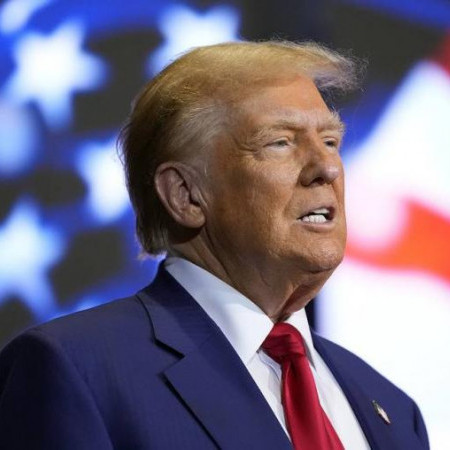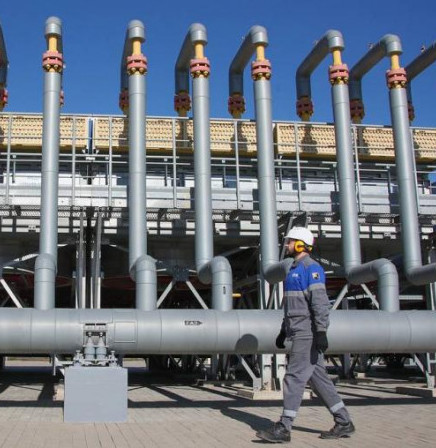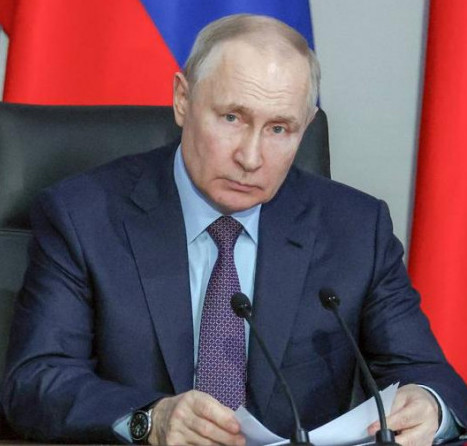OPEC+ Monitoring Committee opts to maintain production policy and evaluates Trump’s requests; USAID's future remains uncertain amid Trump administration's foreign aid suspension; and Hamas representatives visit Moscow for the third time since the start of the Gaza conflict. These stories topped Tuesday’s newspaper headlines across Russia, according to TASS news agency.
Nezavisimaya Gazeta: OPEC+ Monitoring Committee opts to retain production policy
A meeting of the OPEC+ Joint Ministerial Monitoring Committee (JMMC) was held on Monday to review the situation on the oil market and the parameters of the agreement to limit production. According to experts interviewed by Nezavisimaya Gazeta, the actual main topic of the meeting was the energy policy of US President Donald Trump, who insists on an immediate reduction in prices.
The JMMC, co-chaired by Russia and Saudi Arabia, decided not to alter the current oil production policy. At the same time, Kazakhstan’s Energy Minister Almasadam Satkaliyev earlier said that OPEC+ plans to adopt an agreed position at the meeting on the US plans to boost oil production. Earlier, Donald Trump publicly called on OPEC and Saudi Arabia to lower oil prices, saying it was necessary to quickly end the crisis in Ukraine. According to him, if the price falls, the conflict between Russia and Ukraine will end immediately.
The oil cartel did not give an official response to Trump’s demand. However, OPEC+ representatives doubted that the association would make any changes to the current plans, which include raising oil production from April.
Experts believe that amid uncertainty in the global oil market, including the developments related to the prospects for growth in US supplies, OPEC+ is unlikely to approve Trump’s proposal. "First, the increase in oil production in the US will take a long time to put pressure on the global price of oil, so there is no need to rush. Second, the current price of the benchmark Brent crude oil blend remains at a comfortable level of $76.7 per barrel, and the cutting of quotas or voluntary curtailment of oil export volumes occurred after its price fell below $70 per barrel and remained there for a long time," Freedom Finance Global analyst Vladimir Chernov told the newspaper.
"Trump’s plans to increase oil production and boost the oil industry in the United States should not have a direct impact on the level of Russia’s oil output. However, it may significantly affect oil prices in the future, which is why Russia may once again reduce production within the OPEC+ agreement and voluntarily limit the volume of exports from the Russian Federation," Chernov emphasized. He also believes that Trump is capable of increasing the sanctions pressure on the Russian oil industry.
According to Alexander Firanchuk, senior researcher at the International Trade Laboratory of the Gaidar Institute, US companies are unlikely to increase production in response to falling prices. The risk is different - if Trump initiates a real global trade war, it will inevitably lead to a cooling of the global economy and, as a result, to a decline in oil demand, the expert stressed.
Trump’s implementation of the plan to increase oil production in the United States may affect world oil prices, which will decrease as the production and supply of US oil to the world market increases, Gaidar Institute expert Gasan Ramazanov added.
Izvestia: US changes its mind about funding Central Asia suspending USAID regional aid programs
The US Agency for International Development USAID (the organization’s activities have been terminated and banned in Russia) has stopped its activities, which particularly impacted the countries of Central Asia, where the US and the EU have recently become more active, Izvestia writes. For 30 years, the countries of the region have received money for social, educational, media, and health projects. Against this background, Russia and China, which the Western countries have been trying to push out of the region for so long, may increase their influence.
US president Donald Trump signed a decree halting USAID’s international aid programs for 90 days on the day of his inauguration. In response, Secretary of State Marco Rubio issued a directive prohibiting the State Department and USAID from providing foreign aid until the programs are reviewed. Previously, about 90% of US foreign aid was provided by these two agencies. One thing is clear so far - the actions taken may point to the creation of a downsized version of USAID, Izvestia writes.
USAID has been funding social, educational, media, health, and public administration projects in Central Asia for 30 years. More recently, the US and the EU have been actively engaging with the countries of Central Asia in an attempt to push Russia and China out of the region, Izvestia writes. Before the Trump administration came to power, Washington reported that the G7 countries were ready to invest up to $200 bln in the development of infrastructure projects in the region.
In the current situation, the void in Central Asia left by USAID’s departure can be occupied by other actors. In particular, China is actively investing in educational programs in the region. Russia can bolster its influence by enhancing cultural cooperation and deepening political ties if Moscow offers alternatives that take into account the interests of the Central Asian countries, according to the newspaper.
Razil Guzayev, junior researcher at the Department of the Near and Post-Soviet East of the Institute of Scientific Information on Social Sciences of the Russian Academy of Sciences, noted that the West, recognizing the importance of cooperation with Central Asia for Russia, has long been trying to win over the states of the region.
"US funding has always been very ideologically driven," Rustam Burnashev, professor at the Kazakh-German University told Izvestia, adding that it is not yet clear what will happen next with the USAID agency. "There can be no replacement, because there is an ideological burden. It is quite seriously confronted with the policies of Russia and China," the expert stressed.
Vedomosti: Why Hamas visited Moscow for the third time since outbreak of Gaza conflict
Russian citizen Alexander Trufanov, who is being held by the radical Palestinian movement Hamas, will soon be released, deputy chairman of the Hamas political bureau Mousa Abu Marzouk said during his visit to Moscow on February 3. This is the third Hamas delegation since the start of the Gaza war with the group’s attack on Israel on October 7. According to experts interviewed by Vedomosti, Russia’s main goal is to shift Hamas toward a constructive position and to work towards forming a unified Palestinian platform capable of governing Gaza.
The first stage of the Gaza ceasefire, which began on January 19 and will last 42 days, involves the exchange of 33 Israeli hostages for some 1,900 Palestinian prisoners. Trufanov’s name is on the list of hostages. Russian Deputy Foreign Minister Mikhail Bogdanov was negotiating his release before the truce began on January 16. Another serviceman held by Hamas, Maxim Kharkin, will be released in the second phase of the agreement with Israel. At the time of his capture, Kharkin, a native of Donbass, did not have Russian citizenship. It was obtained by his family so that Moscow could assist in his release.
In addition to the release of Russians detained by Hamas, humanitarian aid was also discussed in Moscow on February 3. Representatives of the group requested it "to alleviate the humanitarian crisis in the Gaza Strip".
Hamas remains an actor that cannot be ignored - it still controls Gaza, expert at the Russian International Affairs Council Kirill Semenov told Vedomosti. According to him, the military actions have shown the ineffectiveness of attempts to eliminate the movement through force. Russia’s task is to bring Hamas back to a more constructive position and take steps to create a unified Palestinian platform that could govern Gaza.
Moscow has longstanding relations with Hamas, the expert emphasized, which have not disappeared due to negative assessments of the Palestinian actions on October 7. At the same time, Russia also maintains relations with Israel, so its role in resolving the conflict will be in high demand, Semenov added.
Most likely, Russia’s humanitarian aid for Gaza will be limited to medicine, food, and water, Stanislav Lazovsky, junior research fellow at the Center for Middle East Studies at the Institute of World Economy and International Relations believes. Russia should not be expected to invest in the reconstruction of Gaza: the state of the ceasefire is ambiguous, and the economic benefits of such a decision are unclear, the expert concluded.
Izvestia: Slovakia prepared to block 16th package of EU sanctions against Russia
Slovakia intends to block the adoption of the 16th package of European sanctions against Russia if Ukraine does not resume the transit of Russian gas through its territory, MEP Lubos Blaha told Izvestia. According to him, Bratislava also opposes the EU introducing any ban on gas imports from Russia. Earlier, Hungarian Prime Minister Viktor Orban also announced his readiness to use his veto power to freeze the extension of restrictions if Brussels does not ensure Budapest’s energy security. Against this background, the EU is developing a new, 16th package of measures, which may include an embargo on gas and aluminum imports.
"Slovakia may not only do this, but I am convinced that if Ukraine continues to block gas transit through its territory, our Prime Minister Robert Fico will do it," Lubos Blaha told Izvestia. "We understand very clearly: if someone takes openly hostile steps against us in order to harm not only Slovakia, but the entire EU, then it is only natural they receive an appropriate response," he added.
In addition to a possible ban on gas imports, the inclusion of restrictions on aluminum trade, disconnection of new banks from SWIFT, and restrictions on dozens of tankers in the 16th package are being discussed, Bloomberg wrote. The consideration of the 16th package is expected in February, EU High Representative for Foreign Affairs and Security Policy Kaja Kallas noted.
"The United States does not hide the fact that they would like to supply their gas to the large European market at inflated prices, this would be a huge business for them. For such a deal, they can do anything, including destroying underwater gas pipelines and inciting a conflict between Ukraine and the EU over the shipment of gas through Ukraine," Lubos Blaha told the newspaper.
A possible gas embargo will harm all EU countries, even those that do not depend on Russian gas. A reduction in its availability on the market will lead to a shortage and a rise in prices on the stock exchange, expert at the Financial University and the National Energy Security Fund Igor Yushkov told Izvestia. "The EU is currently selling off its reserves quickly and by the end of the heating season the UGS capacity will be 30%," the expert noted.
At the same time, a possible ban on gas exports to the EU will not cause significant damage to Russia, Izvestia writes. There is no export duty on LNG shipments in Russia, so budget revenues in this area will not suffer.
Vedomosti: Egypt emerges as largest importer of Russian wheat
In the first half of the 2024-2025 agricultural year (July-December 2024), Egypt has ranked as the leading importer of Russian wheat, according to the Union of Grain Exporters and Producers and Rusagrotrans analytical center. According to the analytical center, Egypt’s purchases of Russian wheat during this period increased by 1.8 times year-on-year to 5.45 mln tons. According to experts interviewed by Vedomosti, the growth in purchases was ensured by the volatility of the local currency and attractive grain prices.
The union does not provide data on volumes, saying only that Egypt, Turkey, Iran, Bangladesh, and Saudi Arabia bought the most Russian grain during this period. Wheat is the main type of grain exported from Russia. In total, from July to December last year, Russia supplied 37 mln tons of grain and legumes to foreign markets, including 30 mln tons of wheat (+7% year-on-year), the union noted.
A source familiar with industry statistics told Vedomosti that Egypt was the last leader in purchasing Russian wheat in 2020 - at the time, in July-December, the import volume amounted to almost 6 mln tons. In 2020-2023, Turkey was the biggest buyer. But in the second half of 2024, it gave way not only to Egypt, but also to Bangladesh, the source said.
According to Andrey Neduzhko, CEO of Steppe agroholding, the rise in export volumes to Egypt was driven by the "comparatively low" level of global prices for Black Sea wheat and the attractive pricing strategy of Russian exporters targeting private buyers in Egypt, who constituted the majority of recipients.
The key advantage of Russian wheat exports to Egypt lies in their low transportation expenses, analyst for Agro-Industrial Complex and Consumer Sector practice at Strategy Partners Konstantin Vlasov told the newspaper. However, he pointed out that a prolonged payment cycle poses a challenge for grain exporters, as Egyptian companies may take up to nine months to complete payments.
TASS is not responsible for the material quoted in these press reviews



